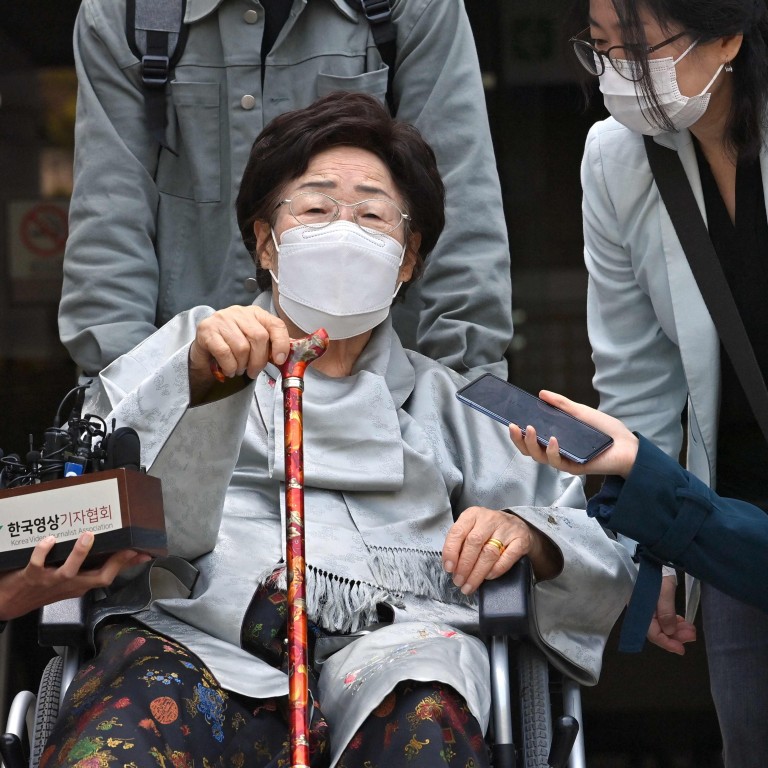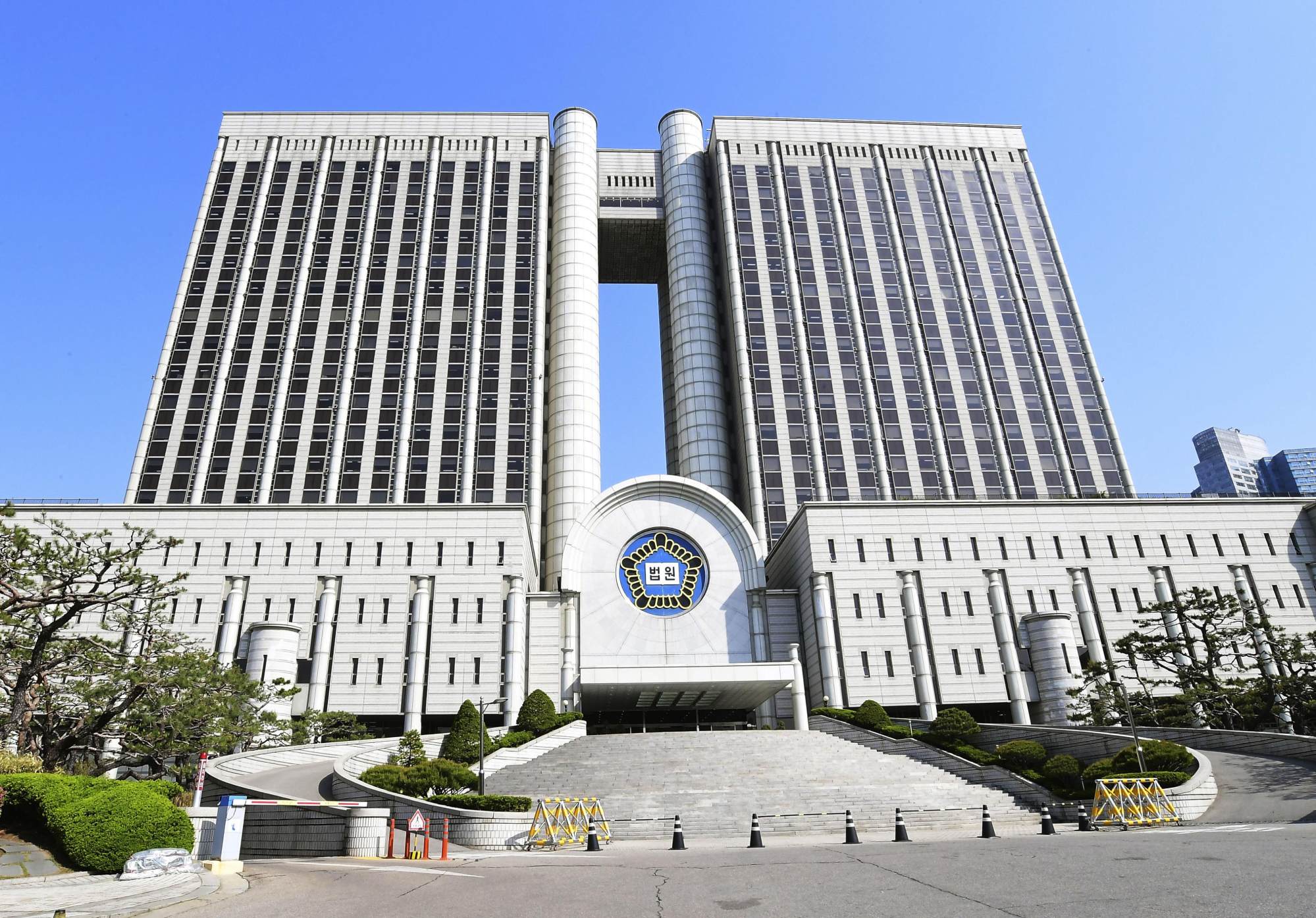
South Korean court dismisses ‘comfort women’ claim against Japan, reversing earlier ruling
- The same court had ruled in January that Japan must pay reparations to victims of wartime sexual enslavement
- It remains to be seen if the ruling will mend tensions over issues like territorial disputes, colonial history and wartime compensation
Senior Judge Min Seong-cheol of the Seoul Central District Court ruled against the case brought by 20 plaintiffs, citing the “jurisdictional immunity of the state”, a legal doctrine that allows a state to be immune from a civil suit in foreign courts.
The plaintiffs, including surviving victims euphemistically called “comfort women” who were forced to work in wartime brothels for Japanese soldiers, filed the lawsuit in December 2016. But the legal proceedings were delayed because Tokyo refused to respond.
South Korea orders Japan to pay damages to group of former ‘comfort women’
In January, a different judge of the same court ordered Japan to make financial reparations of 100 million won (US$91,300) each to the first group of 12 victims, in the first legal victory for South Korean victims of wartime sexual enslavement.
At the time, it rejected Japan’s claim that the case should be dropped because of sovereign immunity and said the rule should not apply to “systematic crimes against humanity” and war crimes.
Tokyo maintained that it had no obligation to follow the ruling because a South Korean court had no jurisdiction over Japan.
But in Wednesday’s ruling, Judge Min noted that 99 out of 240 victims had already received compensation from a Japanese-financed fund set up under a 2015 agreement by the two governments, calling the fund a legal remedy designed for the plaintiffs.
“Victims have suffered greatly and the Korean government’s efforts to relieve their pain were not sufficient … [However], the issue of ‘comfort women’ should be resolved through other means including diplomatic negotiations,” the judge said.
“As the 2015 agreement is still in effect and reparations have been made, it is not proper to deny [Japan’s] jurisdictional immunity of the state.”

Lee Yong-su, a 92-year-old former “comfort woman” and one of the 20 plaintiffs, said she was disappointed at the ruling, adding: “We have to go to the International Court of Justice (ICJ)”.
Neither Seoul nor Tokyo have officially commented yet on the ruling, but Japan’s top government spokesman Katsunobu Kato earlier stated that the “the January ruling violated international law and the agreement between Japan and South Korea”. The South Korean government has stated that it believes the individual suffering of many victims was not covered by a 1965 treaty signed by the two countries which declared that claims between them and their nationals had been settled.
Today’s ruling represents a compromise between Korean people’s sentiments against Japan’s colonial past and international reality
Professor Ha Jong-moon of the Hanshin University in Seoul, however, noted that the UN’s highest court applied the jurisdictional immunity of the state in a 2012 ruling, finding that Italy was wrong to allow its courts to make claims for compensation against Germany for Nazi war crimes.
The International Court of Justice’s ruling at that time confirmed Germany has legal immunity from being sued in foreign courts by victims of such crimes. Germany, which has paid tens of billions of dollars in reparations since the 1950s, appealed to the UN court in 2008 after Italy’s Supreme Court backed a claim by a former slave labourer.
In Japan, some ethnic Koreans identify as people of Joseon
“Today’s ruling represents a compromise between Korean people’s sentiments against Japan’s colonial past and international reality,” Professor Ha told This Week in Asia.
“But it remains to be seen whether it could start efforts to mend fences with Japan as ties between the two countries have been frayed so much” over issues such as territorial disputes, Japan’s history textbooks, how to handle North Korea, as well as compensation for victims of Japan’s wartime atrocities, he said.
The “comfort women” issue has been at the core of frosty relations between the two neighbours, despite the 1965 treaty. Tensions further flared after a series of South Korean court decisions from late 2018 demanding Japan pay compensation to Koreans conscripted to work at Japanese factories and mines during its 1910-1945 colonial rule over the Korean peninsula.
Seoul and Tokyo are both major US allies, democracies and market economies, but Washington was forced to step in when South Korea threatened in 2019 to withdraw from a joint intelligence-sharing agreement, with Seoul backing down at the last minute.
US, South Korea, Japan to work together on North Korea denuclearisation
Biden held his first summit with Japanese Prime Minister Yoshihide Suga at the weekend and will meet South Korean President Moon Jae-in next month.
Can Japan afford Suga’s military spending promise to Biden?
Historians say up to 200,000 women, mostly from Korea but also other parts of Asia including China, were forced to work in Japanese military brothels during World War II.
The Japanese government denies it is directly responsible for the wartime abuses, maintaining that the victims were recruited by civilians and that the brothels were commercially operated.
Additional reporting by Agence France-Presse, Bloomberg


